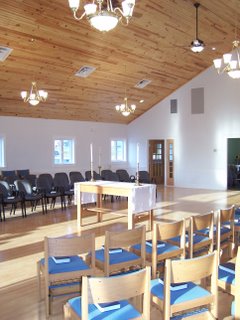Wednesday, 22 March 2006 The Feast of James de Koven
Some people see the church as an institution for the preservation of the Gospel: its liturgy, music, socialization etc.
Others see the church as a permanent revolution: The Gospel as a force that transforms.
On the first Sunday of my sabbatical in 2004, Nancye and I went to a service at The Vineyard Church in Columbus. It is a huge place that looks more like a Mall than a church. A large interior court yard, with coffee and breakfast stations; you have to pay for breakfast even for coffee. There is to the side a cafe which serves fast food. There is a book store and off in several directions what appear to be offices and class rooms. The auditorium is in a square room with the stage, for that is what it is, in a corner. Elaborate lighting, projection, music and sound equipment. The music is for listening, even though many try to sing along. The amplified band performs rather than leads singing. Half hour sermon plus altar call. Communion done very informally with individual containers of wafer and grape juice.
Why can't we Episcopalians develop the enthusiasm, economy of scale, expertise, welcoming that these people have?
If the Episcopal church dies it will not be because we have a gay bishop, but because we care only about preserving the past.
We need more critical thinking about Bible, morals and culture. We need to draw in new People to Christ. Work for justice and mercy.
I do not understand why some who call themselves evangelical or conservative [Stage Right] find it necessary to deny the validity of the faith life of others. Of others who disagree with them, have had other experiences of God.
Perhaps it is because an alternative experience of God must be denied because otherwise their experience is denied. It seems to me a cardinal tenant of conservatives [Right wingers?] that truth is unitary. Anything that suggests that truth might be multiple is beyond their understanding.
Can we take is as an axiom of liberalism most if not all issues have serveral sides, that truth is both multiple and mysterious? Is it then the case that conservatives [Stage Right] believe that on any issue there is a correct and an incorrect answer? "Ha," he says, It can't be that simple!"
From my standing as a religious liberal and I really am not sure that is what I am; I prefer orthodox, I accept the faith expressions of intolerant people as being legitimate. Buddhists. Southern Baptists. Racial Bigots. Unitarians Roman Catholics. They have all had real experiences of God. I honor these. My experience of God is that the Lord of creation loves and disciplines and supports us all. I' d like to hear that from conservatives.

